BLAKE JENNER rocketed to fame thanks to his turn as Ryder Lynn on the hit television show “Glee”. From there he moved into feature films like “The Edge of Seventeen”, Richard Linklater’s “Everybody Wants Some!”, “The Vanishing of Sidney Hall”, and the recently released “American Animals.” His trajectory is only heading upward. But somewhere in between (as in, between Seasons 4 and 5 of “Glee”), Blake turned his thoughts to writing. Putting pen to paper, Blake explored thoughts and emotions of depth and intensity and ultimately delivered a viscerally emotional and compelling character study with BILLY BOY. Focusing on a young man, Billy Forsetti, at a crossroads in his life and facing a problematic past but a future filled with potential, Blake dives in head first creating not only the three-dimensional and compelling Billy, but richly textured supporting characters who comprise Billy’s world.
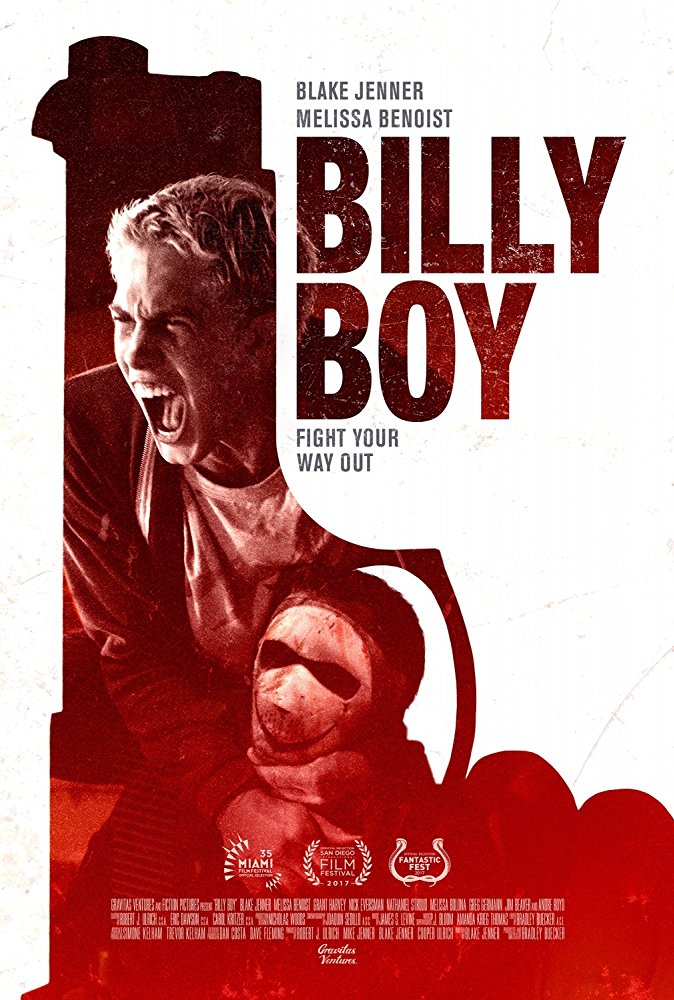
Not only writing BILLY BOY, but serving as a creative producer and starring as Billy, Blake also teamed-up with some of his “Glee” family to help bring this film to life and light, starting with director Brad Buecker, as well as cinematographer Joaquin Sedillo, and “Glee” casting director Robert J. Ulrich who serves as one of BILLY BOY’s producers. The established camaraderie and collaborative nature of the process shows on screen with a textured yet polished look with emotionally evocative camera stylings, all thanks to a visual tonal bandwidth designed by Buecker and Sedillo, adding its own strong layer of storytelling to the mix. Then add in the terrific supporting cast of Grant Harvey, Nick Eversman, and Nathaniel Stroud as Billy’s besties and the portrait is complete. A creative storytelling twist comes with the editing as Buecker, who also edited the film, adds a unique “reverse/rewind” visual that serves as a metaphor to what’s happening within Billy’s mind as life events unfold. Could he have changed his destiny if he hadn’t done this or that and made other choices? A crossroads all can relate to at some point in their lives.
But as I discovered in speaking with Blake, this is a young man whose greatest professional crossroad to now conquer is deciding whether to continue to act and tackle more challenging roles such as that of BILLY BOY, continue with screenwriting for which he has clearly demonstrated his talent, move into directing, or do them all.
One of the nicest young men one can ever hope to meet, read on and learn about BLAKE JENNER’s journey with BILLY BOY in this exclusive interview . . .
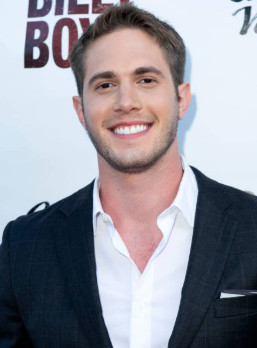
First screenplay. Heavy drama. Incredible character study. Very well developed characters. I applaud you. So, so well done, Blake.
Oh. I appreciate that. Thank you. It’s been a long time coming and our director Brad [Buecker]’s handling of this thing, piecing it together and coming up with a cool way to kind of portray this story, so that means so much to me. Thank you.
I’m curious because this is a very unique way that Brad has put the visuals together in terms of having footage going in reverse to demonstrate backtracks in time and flashbacks and I’m curious how that comports with what you actually wrote in the screenplay. Did you work in transitions like that to go back and forth in time?
Honestly, in the first version of it, there was something kind of like that, I think. In the first version, the first cut of the film, some moments would just complement each other going back and forth but it wasn’t what is now. The way it is now, we kind of found it interesting to play with a young teenager’s memory, who’s going through a lot, and his mind’s kind of on hyperdrive. We felt like that was way more fitting for this type of story, to kind of match Billy’s adrenaline, to be kind of on the same wavelength with his mind as he’s recollecting all these events.
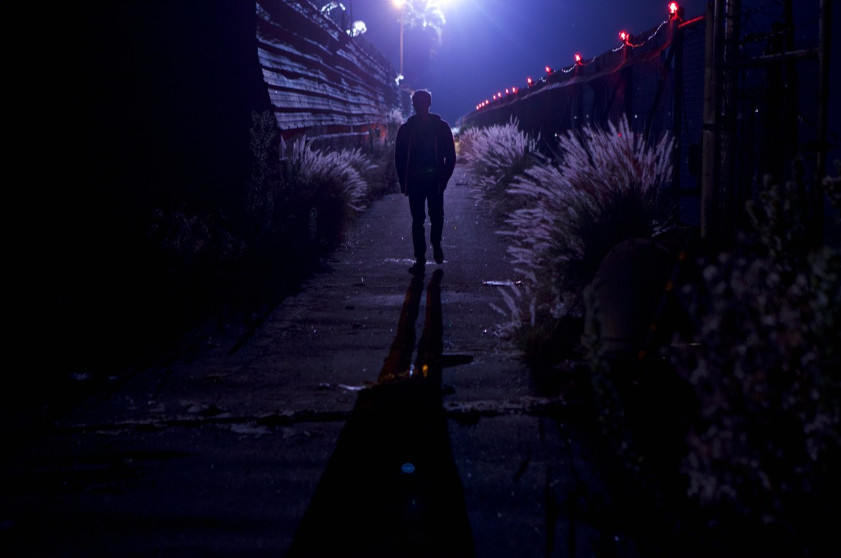
It’s a very unique, stylized way of telling this story and it’s very appealing when you watch. And then you throw in the beautiful cinematography that Joaquin [Sedillo] does. Everything he touched on “Glee” was always gorgeous, as is “American Horror Story”, so I’m not surprised. Very impressive. So, where did this story come from, Blake? I’m curious how you developed and came up with this story and developed the character of Billy, because he is a young man who has, as all of us, a past but, unlike many of us, he actually has potential. Then you counter that with somebody like the character of Mikey who is forever stuck and you see this. There is no potential for him to get out of the mess that he has created in the world. I’m very interested in your characterization and your structuring there in developing that.
Yeah. I’ve always loved movies like that, the discovery and loss of potential in a young person who feels like all the odds are against him and he just wants someone to listen. I love movies like “Basketball Diaries” and “Good Will Hunting”. Movies like that. “This Boy’s Life.” [I loved] movies like that growing up. I always related to them in a certain way. No, I didn’t go through the same things as Billy or any of those characters of those other movies, but I felt the similar emotional wavelength, especially with the past and we’ve all felt lost, we’ve all felt misunderstood and angry. I kind of just started writing that; writing it from that corner of my heart. I didn’t start planning or anything. I kind of just treated it as if I was writing a diary for someone else. And I just got hooked to learn more about the characters as I kept going. That’s what excited me. I bounced the first nine pages off a couple of people and they all told me to keep going. I decided to marry this idea and just see it through. Obviously, I knew it would be inspiring to play this character. I’ve always wanted to play a character like this. That was a driving force. I’d never take [the role] on the script when I was writing it if I didn’t feel like I had any ammunition to bring to it. I’d leave it alone and let it breathe. But yeah, that was all the driving force of kind of diving into it and really feeling a sense of attachment to the character and the story.

And then, of course, your support, the group around Billy. I’ve got to say, Nathaniel Stroud. I love his character of Josh.
I’m going to tell him you said that! He’s a good friend of mine. I’m going to tell him you said that.
The chemistry between the two of you on camera is absolutely beautiful. I really, really love seeing that dynamic between the two of you. But Nathaniel’s performance as Josh is just so exuberant, especially in the flashbacks, so wonderful. Then you bring in Mr. Adams … just so loving. That’s a part of the story where we really see the potential that Billy has, because of moments and relationships like that as opposed to Grant Harvey’s Mikey, which, have to say, Grant plays delusional and off the wall so well.
Oh, yeah! He’s an extremely gifted actor. Grant. We were so lucky to get him. Anybody could come in, I feel, and just play that role so angry and just mad and just this evil guy; this guy who starts off as a friend but he just becomes more and more evil as you go along. But [Grant] brings a real sense of empathy to that character. And, the sadness. He’s just as lost as everyone else except he’s so afraid of admitting it because the last thing he wants to seem like is weak. That’s his biggest fear, of being caught feeling vulnerable or anything like that. He’s incredible. And Nate, Nathaniel Stroud who plays Josh – we just watched it last night with a crowd and ’cause obviously this is a heavy story, it was always meant to be that way, but he’s the heart of the movie and he kind of comes when you really need him. And just hearing the crowd laugh with him and just enjoying his company and also really enjoying him as a character when essentially you’re getting to know him through memories. He did a beautiful job and I loved working with him. We started doing improv together in Miami when we both lived over there, so it was just a treat getting to do this with him.
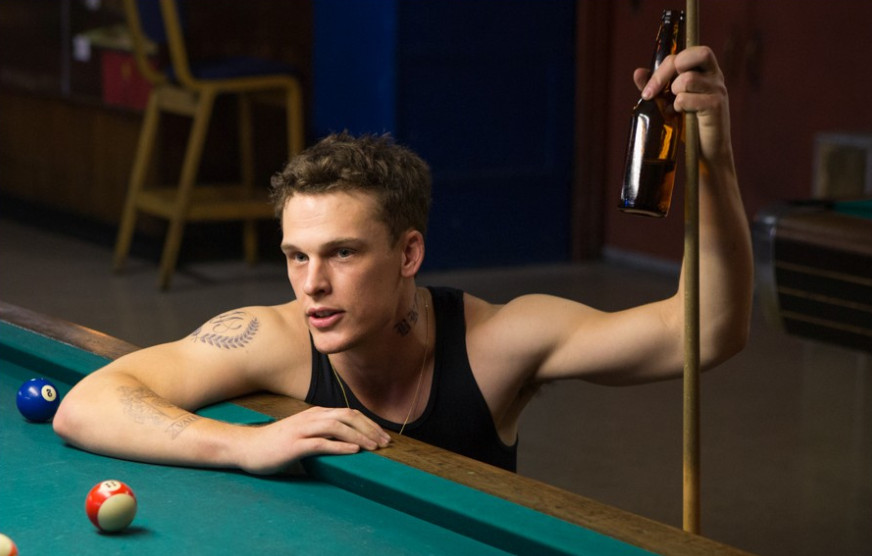
I’m curious, Blake, how long ago did you write the script, from the time you wrote it to when you shot it, til now?
Well, I started writing it between season four and season five of “Glee”. It was when I was like 20 and some change. We’ve kind of been tweaking it, putting it together, finding out the right formula to sell this story with for the past few years. We’ve been dying to get it out there for quite some time. And obviously, getting financing, all that stuff. It’s been about a four-year journey.
As you sit and you look at it now and look back on it, has your perspective, have your thoughts changed? If you were to sit down and write this now-
Oh, yeah. Yeah. I think about that all the time. I think about that anytime I see myself and I always feel like the brushstrokes could be a little different. Obviously, I was writing from a certain part of my heart when I was writing BILLY BOY and I think I’ve definitely matured and evolved from then. I always tell people, it’s strange seeing it now because yes, I do love the movie and everyone in it and we worked so hard on it, but it’s also kind of like a yearbook of experience. Like you change every day. We started shooting this when I was much younger. It’s interesting. I’m kind of seeing the version of a kind of older me. Kind of like taking a walk down memory lane every time I watch it.
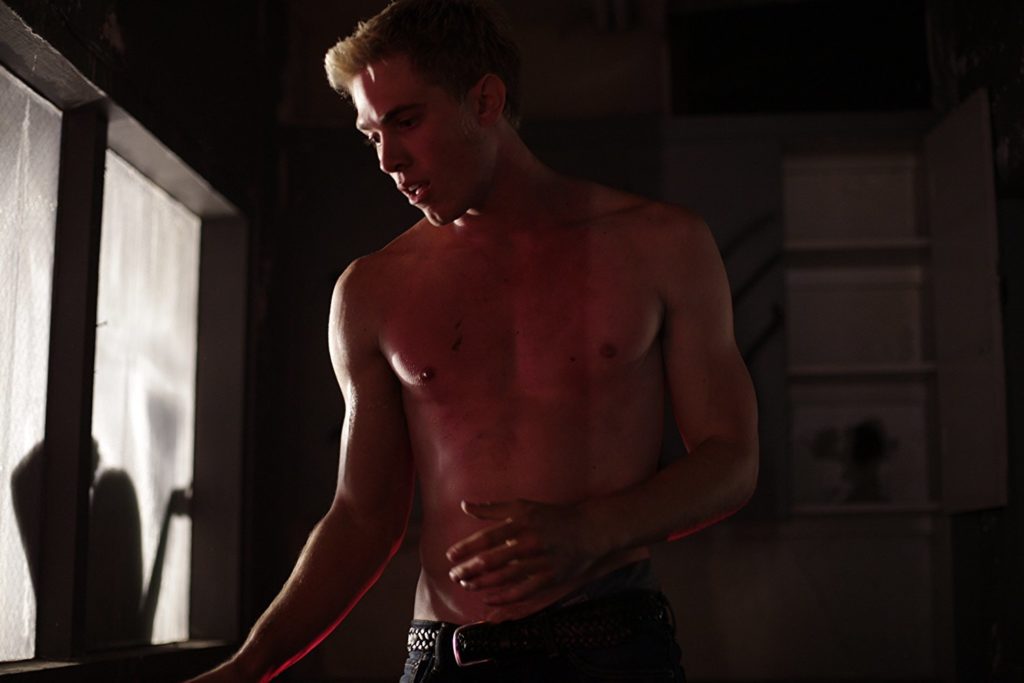
Now, you’re also a producer on this film so I’m curious, how involved were you in the production aspect in terms of the casting and all those elements that go into the making of?
I was there in the trenches with Brad and our producers and everyone with the casting side of things and also there with the helping hand with Brad creatively and with collaborating. Everything on the creative end, I had eyes on. And also, I was taking meetings with potential financiers and stuff and kind of breaking down what the story meant to me and how I viewed it. We started to get funding that way and we did a Kickstarter, which I helped put that together and put out there. But everything with building the structure of the financial waterfall with all the financiers and the producers and stuff, I didn’t have any hand in that. Mainly just anything creative-wise I was lending a helping hand with.
Did you find this process of now stepping up writing, acting, and having a hand in the producing creativity, did you find any of that daunting, a bit of a learning curve?
Absolutely. Absolutely. But I learned so much. I mean, the next time I do this – I learned things that I’ll want to be part of the journey and how I go about things and other ways that were easier avenues in getting a movie made, but you never know until you do it. I definitely feel like I learned a lot that I will take into the next experience. But it was daunting. So many people write scripts that never come to life and I felt like that was just as easy as happened to us. But yeah, I tried to look at it as less daunting and just like a masterclass like everyday. Just being on my toes and kind of soaking it all in.
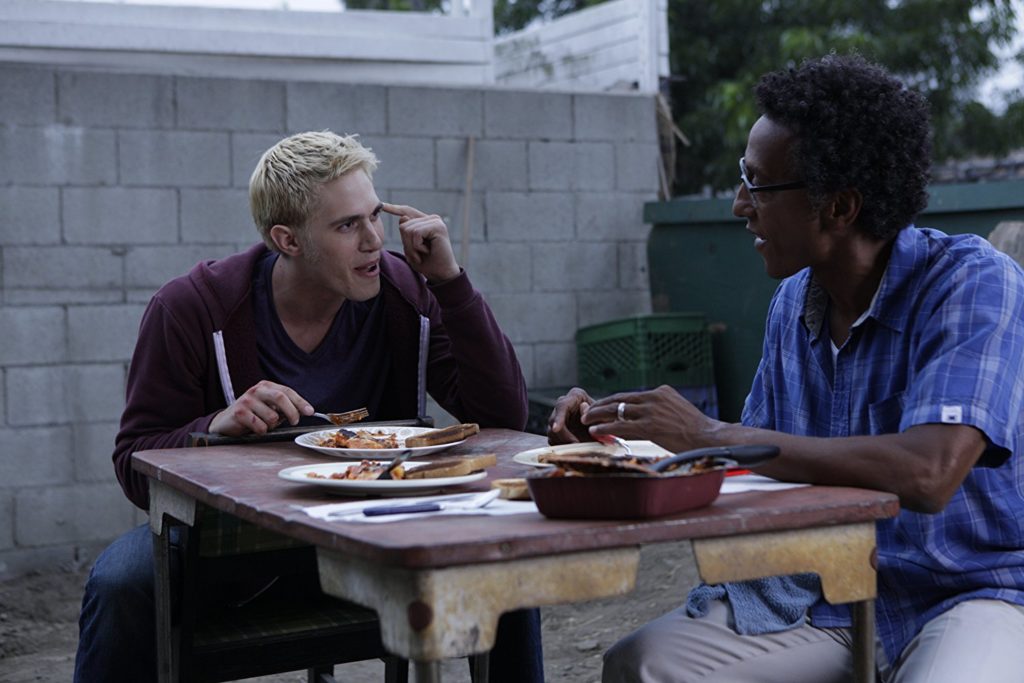
What would you say is probably the biggest thing or things that you did learn in this process that you’ll take forward to your next project?
We had a great open door policy with everyone, actors and director and producers, but how important collaboration is, especially if you wrote it. I think it’s important not to treat this script like a playbook and fortunately, all the directors I’ve worked with have been very open and very gracious with their work if they’ve written the script or if they just want you to kind of feel through the beats as you go. But I definitely feel like if you don’t have any collaboration, that’s just the death of whatever thing you’re trying to do creatively. I think you need to have a lot of skin in the game with the people you’re working with. That was the main thing I took away.
How precious were you with the words on the page? Since you wrote it, you poured your heart and soul into it, you start shooting and all of a sudden Brad may say, “Eh. It doesn’t sound quite right.” Does writer Blake start cringing and go, “Oh God. I really love that line. I don’t want that changed.” How did you encounter any of those moments?
Well, no. There was some things that I had to fight for. There’s an argument between Billy and his mother in the kitchen of the one scene and I felt strongly that it needed to be a heated kind of scene, like the first time Billy kind of wins in his own way. But Brad kind of felt like we needed to go under that tone. There were certain things that I did fight for, but then there are other things that felt like the actors or anyone else had every right to kind of make it their own, because I think spontaneous ideas are kind of what makes a movie too or makes a certain scene. There were some battles but I want everybody to feel like they’ve got some blood in this whole thing.
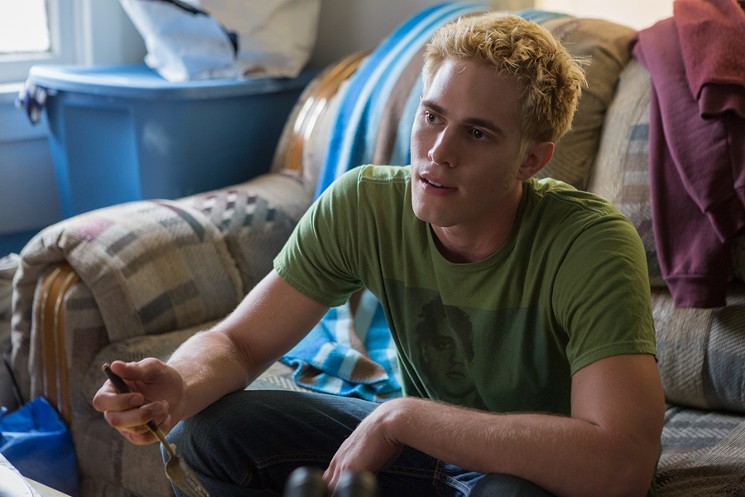
Well, something I’m curious about now, now that you have written your screenplay, it has been made into a feature, it is being released into the world, at least 10 markets on Friday and then further thereafter, do you see yourself stepping more into writing, maybe even moving into directing, stepping back from acting, or will you continue to try to find a balance between them?
I think I’ll continue trying to find a balance between them. I definitely want to direct someday but when it feels right. Maybe when I’m older and kind of like learn more about this business and what it takes and all that stuff. But definitely acting’s my first love. But as long as I can keep writing and creating when something means a lot to me, I think I’ll feel the most like myself.
by debbie elias, interview 06/13/2018












